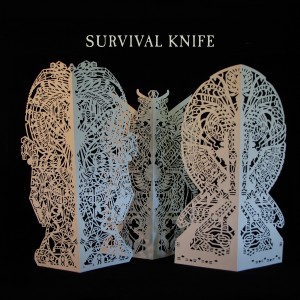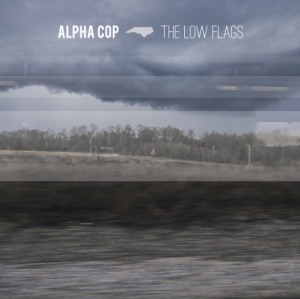
My most anticipated album for ten years running has arrived.
I first heard demos for Atoms and Void’s And Nothing Else sometime in 2005, back when the group was called Ghost Wars and debuting new material on MySpace was normal. To say the project intrigued me is a vast understatement: this collaboration between former Juno singer/guitarist Arlie Carstens and longtime Damien Jurado cohort Eric Fisher faced the immense task of following up my favorite album, Juno’s 2001 opus A Future Lived in Past Tense (which may get an overdue vinyl reissue in the near future). Those initial demos offered a range of possibilities: the IV-drip blues duet “Destroyed, The Sword of Saint Michael,” the alternately plaintive and thunderous post-rock of “Waves of Blood,” and the gentle humanism of the half-instrumental “Lay Down Your Weapons.” Less Dischord and DeSoto, more Kranky and Temporary Residence Limited. The distance from Juno’s dynamic post-punk was evident in these recordings, but even greater in the process, which abandoned Juno’s five-member line-up in favor of a long list of guest musicians steered by Carstens and Fisher, inspired by the legendary sessions for Talk Talk’s Laughing Stock. No, this record would not be a simple sequel to the life-affirming expanse of A Future Lived in Past Tense, but its potential as a spiritual heir was evident from that handful of songs.
No one could have predicted that this potential would take a decade to realize. Dual catastrophes derailed completion of the demos: Eric Fisher’s laptop was stolen in 2006 and the back-up hard drive storing the ProTools sessions was corrupted, leaving the group with only .mp3 mix-downs of the sessions. Repeating the recording process was not an option: reassembling the geographically scattered array of guest musicians would have been a logistical impossibility. Years passed while Carstens and Fisher wrangled with data-recovery services in ultimately futile attempts to reconstruct session architecture. Enthusiasm for the material remained, but momentum was constantly undercut by all-too-familiar varieties of major life events: family illnesses, friends passing away, exhausting new jobs, constant travel. Every few years I’d hear a tantalizing new demo or receive an encouraging progress report, reinforcing my belief that at some point, the album would come out, but seemingly every hurdle was thrown at Carstens and Fisher, even the theft of the group’s original name by a litigious electronic artist.
Despite fate’s cruel, repeated intervention, And Nothing Else finally exists, released digitally in September (on my birthday, no less). Even “The Architect and the Atomizer” offers a red herring of hair-raising guitar rock. After a moody rise and fall laced with strings and piano, Carstens’s checked delivery ignites into a final-minute fire-and-brimstone sermon. Lyrics like “Three years of reprieve / Does not erase a lifetime of grief / Living on your knees / When the water closes there’s nothing left to see / There’ll be no legacy” recall the get-your-shit-together ferocity of “The French Letter” and “You Are the Beautiful Conductor of this Orchestra,” but it’s the only time Carstens assumes that voice on And Nothing Else.
“Lay Down Your Weapons” hits the reset button on listener expectations for the rest of the album, both sonically and lyrically. It resides in the Talk Talk / Bark Psychosis school of post-rock, with carefully arranged piano, an expressive bass line, and subtle electronic surges supplanting distorted guitars in the instrumental palette. It, too, has a Juno throwback, with its opening lines (“Your son / Wanted to talk a nap / So we closed his casket / And tried not to look back”) echoing similar tragedy in “When I Was In ____” (“Your son’s hands stayed warm / Long after he died”). Its previously instrumental second half now completes that sentiment, with multi-tracked vocals urging to “Lay down your weapons / And lay this love to rest / The wanting, the waiting / Will not take you there.” Whereas A Future Lived in Past Tense called for action, “Lay Down Your Weapons” fittingly recognizes that some circumstances are outside of our control, and no amount of struggling or reaching will bring proper closure.
What’s left, then, is mostly quiet contemplation. The lilting “Feathers From a Bird” floats on piano and clarinet, and its brand of ambient classical fits nicely into a growing prominence of that style. “Waves of Blood” continues the instrumental trend but increases the volume with its merger of Mogwai guitars and the double-drummer approach of Fugazi’s The Argument, manned here by Eric Akre of Treepeople/Built to Spill/Juno and J. Clark of Pretty Girls Make Graves. The crashes help raise the album’s heart rate, but the pairing of melancholy guitar and Rhodes melodies highlights the song. “For Sharon, With Love” is the first of the album’s piano ballads, an elegy (“We tried to walk in the light / But we died in the dark”) whose loneliness is embodied in the noticeable action from the keys. Given its somber surroundings, the brightness of “Golden Shivers,” a pulsing Phillip Glass / Steve Reich homage, is quite welcome. “Destroyed” adds a few overdubs to its demo version, but its skeletal feel remains, leaving nothing in the way of its haunting, mythic rumination on guilt. (Trivia: The closest Atoms and Void came to a live performance was Carstens singing a few bars of “Destroyed” during the soundcheck for Juno’s 2006 reunion shows in Seattle.)
The album’s centerpiece is “Virginia Long Exhale,” a song unveiled in 2005 and updated with a near-finished version two years later. It starts out simply enough—“We go down / To the lake”—and dodges instrumental tension with its careful blend of clarinet, bass clarinet, saxophone, Rhodes, and both acoustic and electric guitars. (Drums occasionally appear, but if quizzed on their presence, I would have likely answered incorrectly.) But Carstens breathes devastating emotion in both hushed baritone and expressive falsetto into the song’s water imagery, rotating through a number of possible connotations—childhood games, baptism, suicide—before settling on the image of a body slowly passing away. In the midst of paralyzing grief, we rely on ritual (“This is what we do / When we know / Not what / To do”) to guide loved ones and eventually ourselves to the end. “Virginia Long Exhale” is supremely sad, supremely beautiful.
Whereas “Virginia Long Exhale” lingers in funereal repose, Eric Fisher’s “The Earth Countered” follows with a nervous energy. Layers of wordless humming, flickering acoustic strums, and distant drumming support Fisher’s lone lead vocal turn on And Nothing Else, but the most unsettling element of the song is the eerie calm with which he delivers “You won’t feel a thing.” After single-minute “Lowercase Blues” clears the decks, Carstens’ atmospheric piano ballad “The Conductor” has room to resonate. It’s not as focused lyrically as “Weapons” or “Virginia,” but there’s luxuriant depth to the arrangement, with woodwinds, Jenna Conrad's backing vocals, and echoing guitar softening each piano chord.
And Nothing Else closes with “This Departing Landscape,” which initially continues the trend of near-whispered Arlie Carstens piano ballads. Its scant few lines—“Things go wrong / The light will fade / The dawn will come / And this too shall fade away / But oh, oh, oh / I wish you could have stayed”—encapsulate the album’s themes of loss, renewal, and regret, but the gradual, determined swell of bob-and-weave guitar patterns and ringing piano chords offers a sense of closure and optimism that didn’t seem possible back on “The Architect and the Atomizer.” And Nothing Else is a heavy, often tragic record, but thanks to “This Departing Landscape,” I don’t leave it dwelling on tragedy or guilt, but rather with the feeling that those weights have been lifted.
And Nothing Else is a deeply personal record, both for Atoms and Void and my own listening history, but its translation of specific experiences into emotional connections is exemplary. “This Departing Landscape” generalizes those experiences into “things,” and given the long-term perspective of the album’s decade in development, I transpose write my own narrative from that era into the album. My father succumbing to cancer, my grandmother passing away at 100, my daughter being born. There’s no answer to the easiest question about And Nothing Else—“Was it worth the wait?”—because its excellence is fused to those events in my memory. Yet few albums can carry such a load (Juno’s A Future Lived in Past Tense foremost among them), a point that’s been underlined hundreds of times in the last decade with each album that didn’t measure up to the hypothetical Atoms and Void album I would one day hear, to the tangible Atoms and Void album that now exists. Perhaps one day there will be another Atoms and Void album (there is more material, like the cut-loose rocker “The Elephant in Your Womb”), a vastly different record that would speak to vastly different experiences, but I’ll apply the patience learned since the initial Ghost Wars demos to any potential timetable.
|

The past year and a half has been generous to Unwound devotees. Between the excellent Live Leaves (a document of their five-person tour line-up for the Leaves Turn Inside You originally intended for release in 2003), Numero Group’s Record Store Day 2013 delivery of Justin Trosper and Vern Rumsey’s high-school band Giant Henry’s unreleased album Big Baby, and Numero’s comprehensive, immaculately designed box set of Unwound’s early days, The Kid Is Gone (the start of a must-own series of reissues, continuing in March with Rat Conspiracy), there’s an embarrassment of riches. Hell, you can even buy t-shirts again. What’s lacking from this steady stream of legacy protection is an actual reunion. No tour dates, no new material, as per the Fugazi model.
If you can accept that Unwound won’t be reforming to unleash Leaves Turn Inside Two or hitting your local club to doubled ticket prices, you’re in a good place to hear Justin Trosper and Brandt Sandeno’s new group, Survival Knife. Like any number of second-acts from 1990s staples (Burning Airlines, Jets to Brazil, Evens, and especially Hot Snakes), Survival Knife faces an inevitable, somewhat unfair comparison to their beloved predecessor, one I’ll dive into instead of attempting to avoid. The four available tracks from Survival Knife recall compact rockers from Repetition and Challenge for a Civilized Society (“Corpse Pose,” “Data”) with some of the mechanical precision stripped away. The hard-rock/hardcore directness infused in Survival Knife’s shout-along choruses was absent from much of Unwound’s art-damaged catalog, particularly the sprawling Leaves. And yet Trosper’s musical DNA hasn’t been completely altered; the mutating guitar parts and verse vocal delivery are immediately identifiable as his work.
If you’re forced to choose between the two seven-inch singles Survival Knife issued in 2013— “Traces of Me” b/w “Name That Tune” on Sub Pop; “Divine Mob” b/w “Snakebit” on Kill Rock Stars—pick up the latter. The Sub Pop single is worth checking out if not faced with an unlikely hypothetical situation (two Unwound fanatics come across one copy of each single at precisely the same time…), but “Traces of Me” feels unduly restrained when compared to the abrasive energy and bigger riffs of “Divine Mob” and the Meg Cunningham-howler “Snakebit.” I prefer Survival Knife when it’s held to my throat.
|

First things first: You can view (and sample!) my top 25 albums of 2013 and my top 12 albums of 2012.
Yes, it took me a full year to finish a list for 2012. Yes, it only has twelve albums. No, that doesn’t necessarily imply that 2012 was “a terrible year for music,” nor does my doubled selection total mean that 2013 was “a great year for music.” (Any time I see those grand declarations, my eyes roll into the back of my head.) I listened to fewer albums in 2012, many bands I’d usually slot in by default had an off year, and I had less time and enthusiasm in December to complete a list, let alone replicate my exhausting review of the previous year’s contending titles. Comparatively, tons of bands—familiar and unfamiliar—issued worthy albums in 2013, I regained some energy for listening to and occasionally writing about music, and my wheelhouse genres of angular indie rock and ambient had strong years. I’m unwilling and unprepared to objectively declare 2013 a fantastic year in music for all tastes, but for mine, it certainly was. Subjectivity strikes again!
In case two year-end album lists isn’t enough, here are some supplemental selections.
Ten Honorable Mentions from 2013:
- Brokeback, Brokeback and the Black Rock (“Colossus of Roads”)
- Shane Carruth, Upstream Color Soundtrack (All of it)
- CHVRCHES, The Bones of What You Believe (“Tether”)
- Joanna Gruesome, Weird Sister (“Sugarcrush”)
- Overseas, Overseas (“Old Love”)
- Savages, Silence Yourself (“She Will”)
- Superchunk, I Hate Music (“Void”)
- Tomahawk, Oddfellows (“Southpaw”)
- Justin Walter, Lullabies and Nightmares (“The Way of Five”)
- Yo La Tengo, Fade (“Ohm”)
Eight Excellent Seven-Inch Singles from 2013:
- Alpha Cop / Carton, Split Single
- Julianna Barwick, “Pacing” b/w “Call”
- Daria / Office of Future Plans, Split Single
- Fat History Month / My Dad, Split Single
- Future of the Left, Love Songs for Our Husbands
- Loscil, Sine Studies I
- Lower Dens / Horse Lords, Split Single
- Speedy Ortiz, “Hexxy” b/w “Ka-Prow!”
Two Sources of Ongoing Ethical Conflict
- “Free” concerts offered by shoe companies: I enjoy not paying for things as much as the next guy, but tripping over future landfills worth of Vans promotional garbage at The Walkmen’s potentially final show in Boston and seeing “Converse” emblazoned on the chest of The Men’s bassist has forced me to recognize that corporate back-slapping always has a price.
- Band-circumventing vinyl reissues: I enjoy re-buying beloved 1990s albums that I already own on CD way, way more than the next guy, but 1972 Records’ Stereolab reissues are almost certainly sourced from those very CDs instead of the original masters and have no involvement from Tim Gane or Duophonic, while Shop Radio Cast’s wish-fulfilling pressing of Hum’s You’d Prefer an Astronaut cut Matt Talbott’s attempts to reissue the album on his own terms down at the knees. (Fortunately, he has a stockpile of original copies you can occasionally buy.) Labels, be more like Numero Group and add value to your reissues by actually involving the artists who created them. Bands, be proactive in reissuing your catalogs so that shady operations don’t do it first. Record collectors, investigate the origins of the reissue you’re holding before you plunk down $27.99 on it.
Two New Year’s Resolutions for 2014
- Actually finish reviews and features: If I merged my partially and mostly completed posts from the last two years, I’d have a damn book.
- Keep reminding myself about that first resolution: I'll have a headstart on months of posts, at least.
|

Unlike some of their similarly reformed ’90s indie rock peers, Girls Against Boys (the unfamiliar should consult my primer) aren’t returning from the hard stop of an acrimonious break-up. Their decade of relative inactivity since the Jade Tree–issued You Can’t Fight What You Can’t See was still marked by the occasional live appearance—specifically, the Touch and Go 25th Anniversary Block Party, All Tomorrow’s Parties’ Don’t Look Back, ATP vs. Pitchfork, and a 2009 European tour; generally speaking, anywhere I was not living at the time. Their 3X bass expansion unit could still boot up when called upon, but as a fully functioning machine, GVSB had gone into standby. I’d have to subsist on their consistently excellent discography, particularly their trio of superlative LPs on Touch and Go, and cross my fingers that one of these appearances would be in my time zone.
Three surprises greeted me in 2013: first, Girls Against Boys announced a brief East Coast tour, including a stop at Great Scott in Allston; second, a pairing forged at the Absolutely Free Festival in Belgium made its way to the American bills as well, with The Jesus Lizard’s David Yow accompanying GVSB for part of their set; third, The Ghost List EP was announced for a fall release on Epitonic. Of the three, new material was the stunner. (David Yow keeping it in his pants was a close second.) It’s one thing to issue an EP after a decade of heavy touring, but with only sporadic events on their calendar, Girls Against Boys weren’t the likeliest candidates to present new songs.
Not that I’m arguing with this development. Similar to Superchunk’s post-hiatus records, Girls Against Boys slip comfortably back into their trademark sound on The Ghost List. Its five tracks occupy terrain between the well-oiled machinery of House of GVSB and the up-front melodies of You Can’t Fight…, constructing a veritable bridge over the questionable production values of Freak*on*ica. Despite being assembled from a mix of half-finished song sketches and newly authored tracks, The Ghost List doesn’t prompt a round of when-was-this-song-written like My Bloody Valentine’s M B V.
With only five songs spanning eighteen minutes, The Ghost List wisely avoids filler. Opener “It's a Diamond Life” struts with distorted keyboards and emphatic Eli Janney background vocals while Scott McCloud glares at both one-percenters (“It's a crystal system”) and those overeager to join them (“I don't know what I want / But I want it a lot”). “Fade Out” accelerates from trot to gallop on its chorus, flying by in a scant 2:20. The subtly meta-critical “60 > 15” ("I've heard your volume kills / I’ve seen your psychic thrills") confirms GVSB's rhythm section's continued ownership over mid-tempo pummeling. Despite GVSB’s ongoing emphasis on rhythm, “Let's Get Killed” offers one of their clearest melodies to date, on par with the highlights of You Can't Fight... and “One Dose of Truth” from the Series 7 soundtrack. Finally, “Kick” recalls the genuine malice lurking on Girls Against Boys' mid-period classics. Its orchestral stabs are a successful new addition to their repertoire, even though the EP’s emphasis on trademark-renewal didn’t mandate a step forward.
Here's the only drawback: The Ghost List proves Girls Against Boys can hold their own as a fully reunited band in a modern context, but it doesn't necessarily dictate that they will. The geographical and logistical hurdles that prompted their decade layoff from recording still exist: Scott McCloud lives in Vienna and focuses on the comparatively chill Paramount Styles, Eli Janney is a NYC-based recording engineer/podcast host, Johnny Temple has his hands full with Akashic Books, and Alexis Fleisig drums for three other bands (Paramount Styles, Obits, and Bellini). Maybe a full catalog reissue like Numero's exhaustive Unwound box sets would prompt an overdue critical reappraisal (“Yes, indie rockers did have sex in the 1990s”), further touring, and more material, but the roulette wheel of vinyl reissues could instead land on more stealthy repressings from Touch and Go. I’d prefer the former, obviously, but The Ghost List would stand as a worthy final chapter if Girls Against Boys go back into standby.
|

The only problem—if it qualifies as such—to Bottomless Pit’s otherwise flawless discography to date is insularity. Familiarity with Tim Midyett and Andy Cohen’s previous band Silkworm has been a borderline prerequisite. There are rewards to this condition: comparing and contrasting Hammer of the Gods (2007), the Congress EP (2008), and Blood Under the Bridge (2010) with Silkworm’s extensive catalog enlightens both sides of the equation, since every aesthetic shift is deliberate and carefully chosen, like Bottomless Pit’s signals to the melodic post-punk of early New Order. The lyrical connection is even more significant. Midyett and (to a lesser extent) Cohen have used Bottomless Pit’s music to reconcile their grief over the tragic passing of Silkworm drummer Michael Dahlquist. Bottomless Pit would not exist without Dahlquist’s passing, a truth those records cannot forget. For card-carrying members of Silkworm’s slowly expanding cult following, Bottomless Pit’s songs are immediately devastating, but my concern is whether this insider-oriented dialogue, coupled with the group’s downright inscrutable branding, has turned three of the finest rock records of the last decade into invite-only affairs.
Shade Perennial addresses that concern with a deft achievement: it opens the door, musically, lyrically, and even logistically to newcomers without compromising what made Bottomless Pit such a valuable proposition. Collecting their previous recordings (along with three unreleased tracks) in the Japanese import Lottery 2005–2012 offered Bottomless Pit a clean break in their discography, less a new chapter and more of the next book in the series, and they took full advantage of it. You can pick up Shade Perennial (issued via Comedy Minus One, marking the first time the group hasn’t self-released reference-quality 45 RPM vinyl) and not feel like you’re entering the middle of a conversation, or at least the seemingly private one I described earlier.
The conversation dominating Shade Perennial does not require an invitation. Tim Midyett, Andy Cohen, bassist Brian Orchard, and drummer Chris Manfrin have a chemistry that’s beyond second-nature. There are no clashes over territory: a rare democracy balances Midyett’s baritone guitar surges with Cohen’s chord slashes and strafing leads, and they’ll open up space for Orchard and Manfrin on quieter moments like “Full of Life.” Don’t mistake this observation for minor praise: you don’t get the subtle emotional shading and dynamic arcs of “Fleece,” the swaggering melodic exchange of “Incurable Feeling,” or the sun-peeking-through-the-clouds illumination of “Horse Trading” without completely dismissing egos. And yet for all of this emphasis on shading and detail, Shade Perennial offers some of Bottomless Pit’s most immediate songs to date, especially Andy Cohen’s trio of up-tempo rockers.
The biggest shift on Shade Perennial is in the songwriting department. You still get two distinct, equally compelling lyricists, but Midyett and Cohen’s respective approaches have evolved since Blood Under the Bridge. Most strikingly, no song on Shade Perennial reads as a rumination on the aftermath of Michael Dahlquist’s passing, whereas that topic hung over their first three records. When Midyett invokes King Poseidon in the opening "Fleece," the shift in perspective is jarring. It’s still a personal song, but there’s a creeping darkness (“You can hurt me but you don’t”) that was previously absent from his generally optimistic humanism. It isn’t until the rolling, six-minute closer “Felt a Little Left” that Midyett sounds embodies the eminently likeable Midyett of old, and the repetition of “I know I know I know” practically recognizes it. Cohen takes the opposite tact, further softening his once-contentious approach with an affecting delivery on “Null Set” (“Forgot about you / Myself too”) and poetic imagery in “Sacred Trench” (“They were just shadows”). He still explores atypical relations with humorous barbs (“Shoot the duck and you will win / What we do is like that stupid game / I honestly think I’m too straight to follow”), but at long last, it’s plausible that Cohen himself is the character being studied.
I recognize the apparent irony: even as I argue that Shade Perennial is less insular, less dependent upon Bottomless Pit’s history than its predecessors, I can’t avoid bringing up that history. View this impulse not as an invalidation of my thesis, but as another reward to any new listeners the album invites to the Silkworm/Bottomless Pit narrative. There is a rich history here—a towering stack of records you’ll have to pry from my cold, dead hands; an innate musical discourse within the group that can only come from Midyett and Cohen's 25 years of collaboration; two songwriters with distinct, constantly evolving voices—and Shade Perennial succeeds as both a standalone document and a gateway to what precedes it. Just remember, you don't need to hear all of the records at once.
|

For the purposes of this introductory paragraph, it would have been preferable to have tracked down this split single from two previously unheard, geographically disparate bands through mysterious and/or serendipitous means, but the reality is simple. Jon Solomon played “The Low Flags” from the Raleigh-based Alpha Cop on his Wednesday night WPRB show a month back and, in a possible instance of baiting an audience member, compared its arrangement to Juno. The instrumental outro’s delicate dynamics certainly caught my ear the first time around, but a comparison to Juno guarantees a second. Negative Fun Records BandCamp page bookmarked, vinyl ordered.
The single’s a-side comes from Windsor, Vermont’s Carton, a post-hardcore band with no shortage of riffs. “Fingertips” flips between Drive Like Jehu snarl and Rye Coalition swagger, occasionally adding effect-laden guitar to the proceedings. There are a few points during the song’s nearly five-minute runtime when the supply of rotating guitar parts feels more like a surplus, but the song’s headlong forward momentum makes up for any editorial slippage. “Fingertips” provides more than enough incentive to check out the six-song Sunburst EP, recorded by Justin Pizzoferrato (Dinosaur Jr., Chelsea Light Moving, Speedy Ortiz).
My memory had focused on the final segment of “The Low Flags,” but revisiting it opened my eyes to Alpha Cop’s range. Starting off like the late ’90s emo band of a lost Kinsella brother, the song quickly shifts gears with a quiet transition, gains intensity with a swell of layered guitars, blows off steam with some Hoover-esque post-hardcore, then settles into its graceful, violin-accompanied outro. Those last two minutes are superb, but “The Low Flags” wouldn’t have the same resonance without the build-and-release of its first half.
Continuing the recent, completely welcome trend of digital-only bonus tracks for vinyl releases, the download includes Alpha Cop’s “Point by Point (Instrumental),” six minutes of saxophone-accompanied, meditative post-rock. If “The Low Flags” briefly recalls Hoover, “Point by Point” references the dub instrumentals and horn parts of Fred Erskine’s later bands, like The Boom and June of 44’s last few releases. And yes, Juno’s command of arrangements and atmosphere is in the mix, too. Alpha Cop has a handful of name-your-price releases on BandCamp, including a vocal take of “Point by Point,” but it’s most tempting to lose myself in the fifteen-minute collage of the I’m Going Down with This Ship and Others EP.
Pairing the immediate aggression of Carton with the dynamic arcs of Alpha Cop makes for a satisfying combination, and I’ll keep my eye out for future releases from each band as I catch up on their respective catalogs. But Alpha Cop’s two songs here offer a tantalizing array of directions that a full-length could take with their sound—plaintive emo, cathartic post-hardcore, textural drones, saxophone-and-violin-accompanied post-rock—and, more importantly, the capacity to properly integrate these styles.
|

It’s been four years since Fuck Buttons’ last LP, the ceaselessly enthralling Tarot Sport, and I was starting to wonder when or even if the next one would arrive. Aside from a requisite remix 12” for “Olympians,” their interim output all arrived via Benjamin John Power’s solo project, Blanck Mass, whose 2011 self-titled LP explored the arpeggiated drone landscape populated by Emeralds and Oneohtrix Point Never. That style offered a comfortable distance from Fuck Buttons’ rhythmically driven transcendence, but last year’s fantastic White Math / Polymorph EP added beats and energy, ultimately residing much closer to Power’s main gig. Couple this proximity with the fact that both Blanck Mass and Fuck Buttons had songs chosen for the opening ceremony of the London Olympics, and suddenly a permanent switch in priority becomes less far-fetched.
All such theories were instantly invalidated by Slow Focus’s lead track, “Brainfreeze.” The first twenty-five seconds reorient listener expectations with a hammering, tribal beat before any of the anticipated synthesizers arrive. As if that beat weren’t pummeling enough, reinforcements join the left channel, sloshing my brain from eardrum to eardrum. And yes, the synthesizers do arrive, a bewildering, maximalist array of seagull squiggles, slow-motion turbulence, machinist progressions, and the skyward-aiming glimmers that highlighted Tarot Sport. But at no point did I forget the chain of body blows coming from the drum tracks, even when they drop out mid-song for a much-needed breather.
Fuck Buttons could have easily employed this template throughout Slow Focus, thereby reestablishing the dividing line between it and the less punishing Blanck Mass and stepping forward and away from Tarot Sport, but the six tracks that follow “Brainfreeze”—provided you succeed in pulling “Brainfreeze” off repeat—revel in subverting expectations. “Year of the Dog” cuts the beats out entirely, employing a rapid-fire rendition of Blanck Mass’s arpeggios to unsettling effect. Lead single The Red Wing” (sadly not a spoken-word narrative from Steve Yzerman in the vein of Daft Punk’s “Giorgio by Moroder”) sways sensuously on an unrushed hip-hop beat, even when the foundational synth kicks into overdrive. “Sentients” reminds how well Fuck Buttons have sublimated the noise impulses of Street Horrrsing (i.e., the unintelligible yelling) into ear-turning oddities. Its 8-bit enemy chomping and half-buried feedback tangles add to, rather than overpower, the song’s John Carpenter soundtrack atmosphere. “Prince’s Prize” borrows the funhouse-mirror distortion of Clark’s “Totem Crackerjack.” The appropriately named “Stalker” spotlights the darker tones running throughout Slow Focus with its ten-minute lurk, demonstrating the palette shift from Andrew Weatherall’s often-gleaming production values on Tarot Sport.
If not for its closing track, I’d argue that Slow Focus purposefully sidesteps the immediate bliss-out of “The Lisbon Maru” and “Olympians,” but “Hidden XS” delivers one final narrative-denying blow with its propulsive beats and upward-arcing melodies. It’s both a fist-pump and a tangible exhale, the polar opposite of the cranium-crushing “Brainfreeze.”
I haven’t mentioned the fact that Slow Focus marks the first instance of Fuck Buttons eschewing a name producer (Mogwai’s John Cummings, Weatherall) in favor of handling those duties themselves, in part because there’s no discernible drop in fidelity or inspiration. What this decision does indicate is how the group has gone from being defined by outside sources, whether producers or the wildly divergent names dropped in reviews of Street Horrrsing (Prurient, My Bloody Valentine, Suicide, etc.), to firmly existing within its own realm. It’s more natural now to compare Fuck Buttons to their peers, their side projects, or their past material than to locate them within a broad field of reference points, even if a few of those still pop up. Slow Focus doesn’t offer the same mind-melting revelation of fulfilled promise that Tarot Sport did, because it can’t—I approached it knowing full well what heights they’re capable of reaching. Instead, “Brainfreeze,” “The Red Wing,” and “Hidden XS” excel at exploring unconquered terrain within a defined realm. Subverting expectations may lack the sexiness of surpassing them, but it’s an essential trait for long-term success. Consider my fears of Fuck Buttons’ priority or lifespan completely assuaged.
|

Speedy Ortiz’s Major Arcana is the latest recipient of my newest, weird-but-endearing-but-really-mostly-weird behavior: chastely avoiding the advance singles in favor of hearing the album in its entirety. If not for the NPR stream weakening my self-control, I likely would have waited until I picked up the vinyl at their record release show. It’s like Tim Tebow discovered indie rock. Whether this habit is stranger than my old routine of naming custom players in the EA Sports NHL video game series after members of my favorite bands is debatable—Johnny Temple manned the blue line for at least five years—but such tests of blind trust are more exciting to me than hearing an awaited album piecemeal through blog track debuts.
Most bands who've earned this badge of honor have built that trust on a long track record of excellence, i.e. Bottomless Pit and Joel R. L. Phelps and the Downer Trio, whose forthcoming LPs can safely write themselves into the upper echelons of my year-end list. Speedy Ortiz’s remarkably rapid ascent from solo bedroom project to the Allston basement circuit to Pitchfork/NY Times favorites offers no such security blanket. Major Arcana is their debut LP, provided that the bedroom-era The Death of Speedy Ortiz gets chalked up as their version of a hip-hop mix tape. My trust is based on their limited discography—two bedroom sketchbooks, a pair of worthy singles, and the wonderful Sports EP—and the faith that they’re locked into their upward trajectory. I’ve been burned by fealty before, as my near-mint copy of Neon Bible will dourly attest, and I’ll surely be burned again, but not enough to cease this behavior.
Not this time, fortunately. Major Arcana blows by the lofty projections I’d set, causing me to tear up stacks of charts and graphs in mock disgust. From Darl Fern’s harmonic bass line that opens “Pioneer Spine” to the spiraling cacophony that closes “MKVI,” Major Arcana provides striking combinations of detail and destruction, hooks and claws, empathy and scorn, smarts and snarks. Those pairings aren’t necessarily new for Speedy Ortiz, but it’s hard to think of anything prior that hits as hard as the horror-movie fake-out of “Gary,” lodges in the brain like “I see me and you in the tiger tank,” aims for the heart like the friendship of “No Below,” sharpens its daggers like “Pioneer Spine” (“I want the truth / Even if I gotta rip it from you”), snaps into focus like the anthemic charge of “Plough,” or elicits laughs like the Kenny Powers-biting “I’m getting my dick sucked on the regular” from “Fun.” The pacing steals almost every move from my mix-tape playbook, using the downward arc of “Casper (1995)” to segue into the balladic “No Below,” lodging the pop rush of “Fun” between the album’s two most vicious riffs, and not putting another song after the obvious last song on the album. (It’s an even worse offense if you pull this move, pre-encore, in concert.) That said, it never feels like a mix of their oft-discussed influences, a wise departure from Sports’ role-playing turns.
Major Arcana’s peak is the scorching and dynamic “Cash Cab.” The swaggering bass line and guitar feedback duel alone would have prompted highlighting, but it’s the transition from the break-up pain of its first half (“All the smart ones repress / They get amnesia, and now I want to forget / I loved someone who left me for dead”) to the renewed optimism of its second half (“I wanna be with somebody just like me / Someone who laughs at a crashed car rental / Someone who hurts in an accident / Someone as scared of abandonment”). Make no mistake; Sadie Dupuis is playing an emotional shell game here. She prefaces the latter admission with “Here comes another empty threat,” casts doubt on whether the repeat of “Somebody just like me” is romantic or desperate, and essentially pulls out the rug with the final line “I’ll do all this if you pay me.” But such contradictory sleights of hand don’t detract from the resonance of the song’s best line “And all I’ll ever do is untie all your knots, dissolve all your thoughts.” Like the rest of Major Arcana, “Cash Cab” isn’t easily resolved, and is all the better for it.
What I can easily resolve is the big picture shift that occurred with Major Arcana: Speedy Ortiz found its identity. That’s a remarkable achievement for two short years, but from the songwriting to the performances, Major Arcana is assured. It’s nothing against what came before Major Arcana—if only all bands offered the coming-of-age narrative of Sports, “Cutco,” and “Taylor Swift”—but I’m definitely excited to see what Speedy Ortiz does with their identity now that they’ve nailed it down.
(In return for Speedy Ortiz rewarding my trust, I vowed to write an entire review without mentioning Pavement, Polvo, Unwound, Helium, Archers of Loaf, Versus, Liz Phair, Sebadoh, or Chavez—oh.)
|

Given my fondness for reunited ’90s indie rock bands and current bands influenced by ’90s indie rock, you might think I’m paralyzed by nostalgia for 1996, spending my days watching reruns of The Single Guy, flipping through my high school yearbook, and circling future purchases in the Touch and Go catalog. Unbelievable as it may be, this scenario is not accurate. Two key distinctions: first, I do not pine for my 1996 existence, a key aspect of nostalgia. No part of me wants to return to high school—I literally have nightmares about it happening. Second, with regards to the ’90s music mentioned above, I never stopped enjoying it. I’m not returning to a time when I listened to Chavez, Hum, and Girls Against Boys—I still listen Chavez, Hum, and Girls Against Boys. It’s not like I’m making playlists of the ’90s alt-rock hits that were shoved down my throat; the mere thought of “Brimful of Asha” beckons a cold sweat.
The closest I’ll come to being properly nostalgic is recalling my 120 Minutes routine. I’d stay up until midnight on Sundays to press record, rightfully distrusting the programmable VCR's ability to perform its advertised duty. When I watched the tape, I’d dub favorites like Girls Against Boys’ “Super-Fire” to audio cassette, where school-bus replays would encourage a trip to Circuit City or Media Play to purchase a CD that would, by fiscal necessity, receive almost exclusive attention for a few weeks. A tedious process, yes, but it was my primary method of learning about new music. Contrast that set-up with 2013, where recommendations are dumped on me on an hourly basis from a wide range of sources, music can be freely and easily heard, and new records become ancient within a week. The singularity of my 120 Minutes indoctrination tempts a rose-colored remembrance, at least until Matt Pinfield’s visage starts blathering on about the latest Oasis single.
The song that triggered this 120 Minutes flashback is “Blood from a Loyal Hound,” from Two Inch Astronaut’s Bad Brother. Its component parts project a low-budget video courtesy of Alias or Caroline Records on my wall—the ear-catching opening riff, the verse slow-down, the energy burst into the chorus, the falsetto hook, the passionate spike of its final refrain, and a careening-off-the-walls conclusion. While I can’t create a proper treatment for this hypothetical video without rewatching the clips for "Harnessed in Slums" and "Pat's Trick" all afternoon, here’s the pitch: it opens with a sped-up, possibly colorized version of a mundane day-job (copy shop or coffee house), switches to the band performing when the first verse starts, deftly jump-cuts between the practice space and the day job scenes, gets progressively weirder with the band's wardrobe in each space, then closes on them first performing in and then destroying their hated workplace. The video for "Blood from a Loyal Hound" might never make it into regular rotation or the beloved Buzz Bin, but it would certainly prompt my cycle of cassette dub / Media Play CD purchase / four weeks of singular rotation. Media Play and Circuit City are still doing well, right?
Apologies to Two Inch Astronaut for focusing so heavily on the past; by no means is Bad Brother solely reminiscent of mid-'90s cut-out classics. Like I mentioned in my review of their split single with Boston's Grass Is Green, there's plenty of DeSoto/Dischord post-punk influence here, with particular nods to Devin Ocampo's Faraquet (in the leads) and Medications (in the knotty structures of "He Was Our Boy"). But Two Inch Astronaut push the songs in both more aggressive, post-hardcore and more melodic, '90s alternative rock directions. The wild energy and throttling chords of "Spank Jail" represent the former nicely, splitting the difference between the control of Drive Like Jehu and the caterwauling of Daniel Striped Tiger. As for the alt-rock reference points, I've absolutely racked my brain trying to determine which synapses are firing over mid-tempo anthems like "Check the Yard," and the best I can come up with from the 120 Minutes pool is a less goofy Self, although Hammer No More the Fingers provide a good contemporary touchstone. Consider the crucial difference between a band being melodic and a band having memorable melodies; Two Inch Astronaut belongs firmly in the latter category.
Two Inch Astronaut’s triumvirate of tricky, aggressive, and catchy is awfully hard to top in my book, and Bad Brother flies by even faster than its fat-free twenty-seven-minute runtime. It’s almost a shame that so many of their peers have released similarly excellent LPs of late—almost—since Bad Brother deserves a few weeks of your undivided attention (and not just because you can’t afford any other albums).
|

Three years between albums is not an eternity, but I was beginning to wonder if Ventura would deliver a follow-up to their mammoth 2010 LP We Recruit. Being an ocean away from the Swiss trio’s tour dates, I was left to dwell on their last proper release, a heartily recommended seven-inch released later in 2010 with David Yow on The Jesus Lizard on vocals. When a considerable part of your aesthetic is founded upon ’90s Touch and Go guitar rock (i.e., aggressive, tight, and bullshit-free), teaming with Yow is a potentially dangerous form of wish-fulfillment. I was ignoring the flipside of that coin: Yow was equally fortunate in the team-up, jumping from the Jesus Lizard’s reunion tour into a European vacation with a younger group with something left to prove. The lingering question remained, however: did they already prove it through this dalliance with a noise rock hall of famer?
Apparently not. Ultima Necat is not the product of a band resting on its laurels—it’s a significant step forward from the already impressive We Recruit. Few bands achieve the tonal consistency displayed here: its gravitational pull locks you into a seriously heavy and downright serious forty-two minutes. In true Touch and Go spirit, nothing gets in the way of the songwriting. The production is bruising but clean, delivering its monstrous heft without collapsing underneath it.
Extend that ethic to the lyrical approach, too. We Recruit had moments of gallows humor, but Ultima Necat never cheats its focus. Case in point: I initially anticipated that the album’s epic centerpiece, the nearly twelve-minute “Amputee,” would undercut its wailing refrain “I feel like an amputee / I want my legs back” with a smirk like We Recruit’s “Twenty-Four Thousand People” did, but Phillipe Henchoz instead goes deeper, repeating “I’d like to dance again” and “If that dance could be with you,” his voice breaking down as the riffs lock in. There’s a fearless honesty to it, like Brian McMahan’s wounded vocals on Spiderland: if someone laughs at the vulnerability displayed, they’re the idiot (who will get caught in the crossfire of the seven minutes of escalating riff warfare that follows).
Ultima Necat draws from other pairings of heaviness and vulnerability. The chord progressions of “Little Wolf” echo Hum’s Electra 2000, but its outro dives down to Mastodon’s hull-crushing depths. Henchoz revisits Come’s chord battles with the twangs of “Body Language.” “Intruder” starts out like a malicious version of Codeine, but abandons John Engle’s starker arrangements in favor of layers of back-masked guitars. “Very Elephant Man” head-fakes at the math-rock of Don Caballero’s For Respect before ascending into the territory of Sunny Day Real Estate’s LP2 (h/t Shallow Rewards). Closer “Exquisite and Subtle” floats Herchoz’s vocals and blurred, shoegaze-inflected guitar far above the rhythm section. It’s heavy, yes, but the tractor beam of the preceding eight tracks has been lifted, letting you drift out of orbit.
Even with near-twelve minutes consumed by “Amputee,” Ultima Necat still clocks with a perfect forty-two-minute runtime. Such economy proves essential; the album’s unblinking focus could have turned suffocating with the addition of a few more songs. Instead, I ride out the muscular plateau of “Exquisite and Subtle” and gladly start back at the top with the aptly titled “About to Despair.” Consider Ultima Necat written in pen in the upper echelons of my 2013 year-end list.
Ultima Necat is available digitally though Bandcamp, Amazon, and iTunes. However, it’s well worth importing a physical copy of the vinyl from Africantape or an American distributor for the gatefold sleeve alone.
|
|

